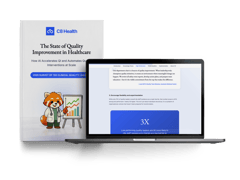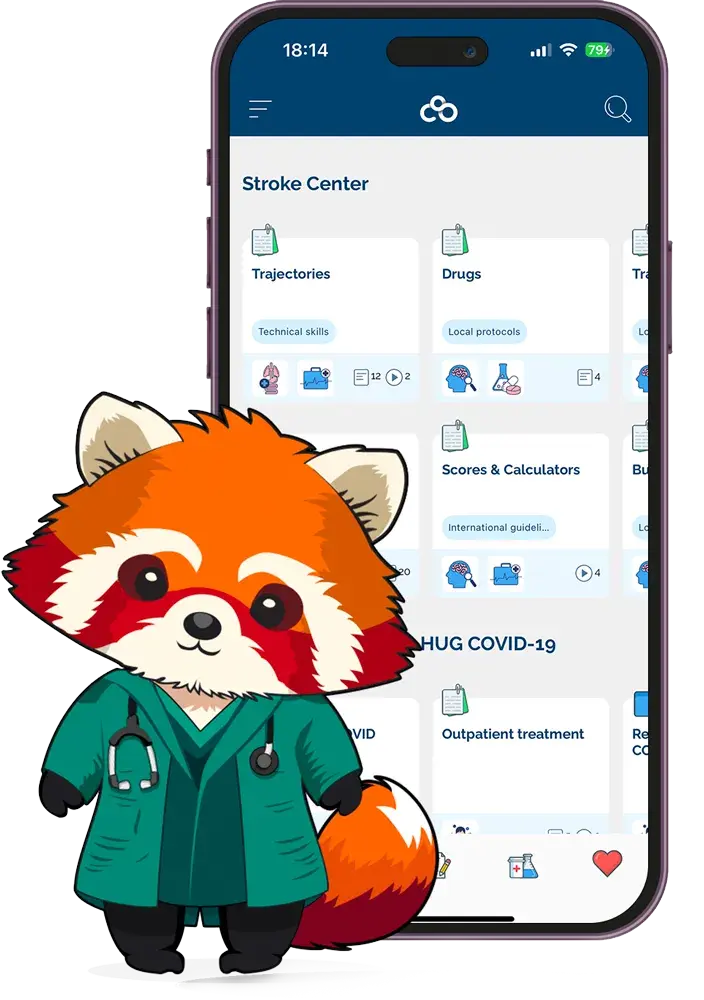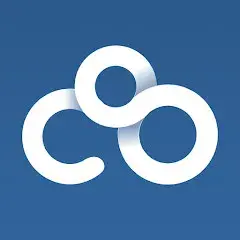
How Efficient Knowledge Management in Healthcare Boosts Patient Care
The hidden crisis in healthcare is more than just a lack of skilled practitioners or cutting-edge treatments. It's the struggle to manage and use knowledge effectively. Every day, providers are flooded with new research, best practices, and patient histories.
For example, a world-class surgeon could miss critical information that could improve a high-risk procedure. Scenarios like this one play out countless times across hospitals and clinics. In fact, 80% of medical errors occur because of problems with sharing and accessing knowledge. [1]
By organizing, sharing, and applying facts, medical professionals can make better decisions, reduce mistakes, and deliver personalized treatment.
» Secure coordinated patient care with a knowledge management tool
How Knowledge Management Improves Patient Care
According to research, a multidisciplinary approach in hospitals is fundamental for proper patient care. [2] For example, head and neck cancer can impact a patient's life due to its potential to impair speech, swallowing, and breathing. A team of medical professionals from various fields, like surgery and oncology, needs to combine their expertise and create the most effective treatment plan. [3]
But, due to the impact on a patient's quality of life, it's crucial to include additional specialists such as nurses, dietitians, psycho-oncologists, social workers, and others. To limit the chances of adverse events, each member of the group must have timely access to information.
» Find out the crucial role of updated clinical guidance
For example, an anesthesiologist needs to know the details of cardiac surgery: how it's happening, which medications to stop beforehand, and any critical moments during the procedure.
» Discover the 8 practices for safe medication administration
In this case, the optimal way to reduce the risk of adverse events is to centralize all the information into a single platform. C8 Health is one such knowledge management tool that can make facts easily accessible to providers so they can apply them.
The platform reduces administrative load by:
- Having a local stakeholder vet every item internally.
- Making information available to your entire team on the web, mobile, and anesthesia stations.
- Updating the whole team automatically on changes via push notifications.
- Using natural language querying with an AI-powered assistant to help staff find information quickly.
What Does Knowledge Management Mean in Healthcare?
Knowledge management in healthcare is the systematic process of creating, organizing, preserving, and sharing medically-related information.
It includes several key aspects:
- Capturing and unifying information from various sources, such as clinical studies, best practices, and regulatory guidelines.
- Filtering, organizing, and presenting it in a searchable and understandable way.
- Translating the facts into action so medical professionals can make better decisions and optimize their clinical practice.
- Preserving and archiving it over time via knowledge bases and institutional management policies.
» Explore the extensive list of knowledge management statistics
Benefits of Knowledge Management in Healthcare
Many medications and treatments emerge every year. In 2023, the Center for Drug Evaluation and Research approved 55 new drugs. [4] Medical professionals need a systematic approach to manage all that information and maintain operational efficiency.
Healthcare knowledge management benefits them through the following:
Reduced Medical Errors
Medical errors are largely preventable. Knowledge management systems can help identify and eliminate potential pitfalls in treatment protocols, clinical processes, and communication breakdowns.
An estimated 795,000 Americans become permanently disabled or die annually across care settings because dangerous diseases are misdiagnosed. [5] With timely and accurate information, practitioners can reduce the chance of these mistakes.
» Learn how to identify gaps in healthcare and close them
Continuous Training and Education
Staying up-to-date and having the best skills are essential for medical professionals to provide optimal care for patients, especially as the field keeps evolving. According to a systematic scoping review, online continuous training improves skills and confidence. [6]
» Check out the best corporate training practices for maximum impact
Healthcare Knowledge management makes this education approach possible by capturing and sharing best practices, evidence-based guidelines, and case studies. It also reduces the time and resources required for new staff onboarding and ongoing professional development.
Collaborative Decision-Making
According to an overview of 34 reviews on the effectiveness of interprofessional cooperation (IPC) in primary care settings, broad collaborations can improve processes and patient satisfaction. [7]
Interestingly, reviews focusing on established models of teamwork, like collaborative care, reported more benefits. But, the variety of studies included made it difficult to compare results directly, often leading to mixed findings.
Efficient healthcare knowledge management improves teamwork by breaking down information silos. The instant access to peer expertise helps staff make informed decisions based on the latest information.
» Learn how to drive operational efficiency with advanced tech solutions
Effective Knowledge Management in Healthcare: Challenges
The healthcare industry is awash in data, with its compound annual data growth rate projected to reach 36% by 2025. [8] This vast trove of information, while valuable, presents a unique set of challenges for healthcare organizations striving to implement efficient knowledge management practices.
Information Overload and Silos
The ongoing digital transformation of healthcare creates an information overload. Healthcare professionals constantly have new research findings, clinical guidelines, and administrative updates to look at.
The amount of data can make it difficult for them to locate and access relevant information when needed, leading to inefficiencies and potential errors in patient care.
Besides volume, valuable knowledge often resides in silos within individual departments, specialties, or even minds. This fragmentation slows collaboration and stops your organization's collective wisdom from reaching its potential.
» Discover the future of healthcare: Mobile technology
Lack of Standardization
Healthcare organizations often use diverse platforms and tools to store and manage their knowledge, leading to inconsistencies and incompatibilities. This lack of standardization makes it cumbersome for medical professionals to find the information they need.
Plus, time is a precious commodity. Providers often struggle to dedicate time to knowledge searching and absorption, leading to a reliance on outdated or inaccurate information.
» Find out why technology is vital for streamlining clinical guidance
Implementation Hurdles
Implementing a knowledge management system in your hospital comes with its own set of problems [9]:
- Infrastructure: Technological limitations and system unreliability.
- Motivation: A lack of motivation among staff to share knowledge.
- Management Support: Insufficient backing from senior management.
- Organizational Issues: Office politics and privacy concerns.
- Clinician Resistance: Reluctance to use technology due to time constraints.
- Limited Incentives: A lack of rewards for documentation and knowledge sharing.
- Awareness: Inadequate understanding of knowledge management systems among staff.
- Cost: High initial investment required.
- Data Quality: Poor quality of patient data, hindering effective knowledge sharing.
- Culture: Unequal status among healthcare professionals and a culture that discourages sharing.
- Centralization: The absence of a central knowledge base system.
- Trust: A lack of trust between colleagues.
Developing and implementing a comprehensive knowledge management strategy requires a systematic approach. You should define goals and form a dedicated team to work on them. Without proper planning and execution, your initiative will fail to deliver.
Managing Knowledge for Better Care
Efficient knowledge management is essential for healthcare professionals because it centralizes knowledge, shares it, and encourages interprofessional collaboration. While implementing it in your organization can be challenging, the benefits far outweigh potential setbacks.
A platform that can do all that will help providers make better decisions, reduce medical errors, and improve patient outcomes.
» Improve patient care with healthcare knowledge management
References:
- A. Tiwary, A. Rimal, B. Paudyal, K. R. Sigdel, and B. Basnyat, "Poor communication by health care professionals may lead to life-threatening complications: examples from two case reports," Wellcome Open Research, vol. 4, p. 7, Jan. 2019, doi: 10.12688/wellcomeopenres.15042.1. Available: https://www.ncbi.nlm.nih.gov/pmc/articles/PMC6694717/
- N. E. Epstein, "Multidisciplinary in-hospital teams improve patient outcomes: A review," Surgical Neurology International, vol. 5, no. 8, p. 295, Jan. 2014, doi: 10.4103/2152-7806.139612. Available: https://www.ncbi.nlm.nih.gov/pmc/articles/PMC4173201/
- M. Taberna et al., "The multidisciplinary team (MDT) approach and quality of care," Frontiers in Oncology, vol. 10, Mar. 2020, doi: 10.3389/fonc.2020.00085. Available: https://www.ncbi.nlm.nih.gov/pmc/articles/PMC7100151/
- "FDA error," FDA. Available: https://www.fda.gov/drugs/novel-drug-approvals-fda/novel-drug-approvals-2023
- D. E. Newman-Toker et al., "Burden of serious harms from diagnostic error in the USA," BMJ Quality & Safety, vol. 33, no. 2, pp. 109-120, Jul. 2023, doi: 10.1136/bmjqs-2021-014130. Available: https://qualitysafety.bmj.com/content/33/2/109
- R. Chaker, M. Hajj-Hassan, and S. Ozanne, "The Effects of Online Continuing Education for Healthcare Professionals: A Systematic Scoping review," Open Education Studies, vol. 6, no. 1, Jan. 2024, doi: 10.1515/edu-2022-0226. Available: https://doi.org/10.1515/edu-2022-0226
- T. Carron et al., "An overview of reviews on interprofessional collaboration in Primary Care: Effectiveness," International Journal of Integrated Care, vol. 21, no. 2, Jan. 2021, doi: 10.5334/ijic.5588. Available: https://pubmed.ncbi.nlm.nih.gov/34220395/
- "RBC Capital Markets | Navigating the changing Face of healthcare episode." Available: https://www.rbccm.com/en/gib/healthcare/episode/the_healthcare_data_explosion
- L. Shahmoradi, R. Safadari, and W. Jimma, "Knowledge management implementation and the tools utilized in healthcare for evidence-based decision making: a systematic review," Ethiopian Journal of Health Sciences, vol. 27, no. 5, p. 541, Aug. 2017, doi: 10.4314/ejhs.v27i5.13. Available: https://www.ncbi.nlm.nih.gov/pmc/articles/PMC5615016/
Disclaimer: Our content serves informational purposes only and shouldn't replace the advice and services of qualified professionals. While we strive for accuracy, we cannot guarantee an entirely error-free experience. C8 Health will not be liable for any losses or damages resulting from the use of our content.



